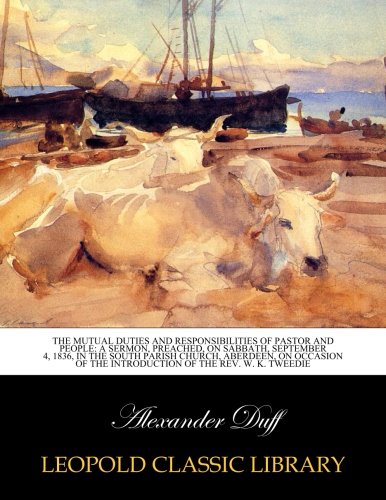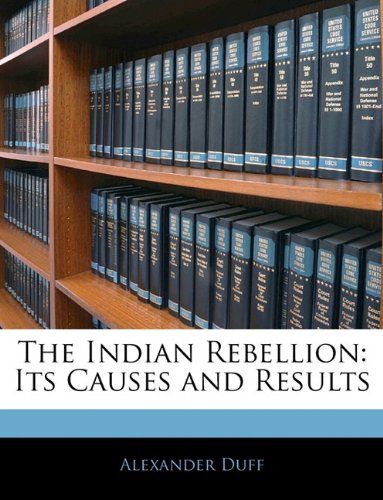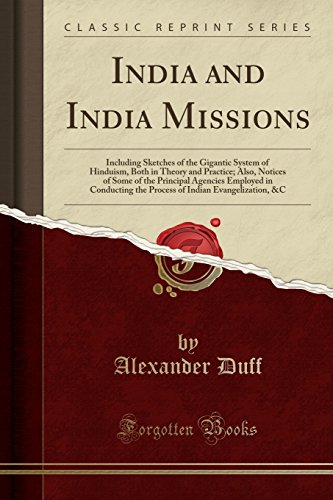Background
Alexander Duff was born on April 26, 1806 in Moulin, Perthshire, into a pious family.



(Leopold Classic Library is delighted to publish this clas...)
Leopold Classic Library is delighted to publish this classic book as part of our extensive collection. As part of our on-going commitment to delivering value to the reader, we have also provided you with a link to a website, where you may download a digital version of this work for free. Many of the books in our collection have been out of print for decades, and therefore have not been accessible to the general public. Whilst the books in this collection have not been hand curated, an aim of our publishing program is to facilitate rapid access to this vast reservoir of literature. As a result of this book being first published many decades ago, it may have occasional imperfections. These imperfections may include poor picture quality, blurred or missing text. While some of these imperfections may have appeared in the original work, others may have resulted from the scanning process that has been applied. However, our view is that this is a significant literary work, which deserves to be brought back into print after many decades. While some publishers have applied optical character recognition (OCR), this approach has its own drawbacks, which include formatting errors, misspelt words, or the presence of inappropriate characters. Our philosophy has been guided by a desire to provide the reader with an experience that is as close as possible to ownership of the original work. We hope that you will enjoy this wonderful classic book, and that the occasional imperfection that it might contain will not detract from the experience.
http://www.amazon.com/gp/product/B00XDAGQUW/?tag=2022091-20

(This is a reproduction of a book published before 1923. T...)
This is a reproduction of a book published before 1923. This book may have occasional imperfections such as missing or blurred pages, poor pictures, errant marks, etc. that were either part of the original artifact, or were introduced by the scanning process. We believe this work is culturally important, and despite the imperfections, have elected to bring it back into print as part of our continuing commitment to the preservation of printed works worldwide. We appreciate your understanding of the imperfections in the preservation process, and hope you enjoy this valuable book.
http://www.amazon.com/gp/product/1142521222/?tag=2022091-20

(Excerpt from Missions the Chief End of the Christian Chur...)
Excerpt from Missions the Chief End of the Christian Church IN the spring of 1839, I happened to be appointed by the Established Presbytery of' Edinburgh to preside at the ordination of the Rev. Dr. Thomas Smith, as a new missionary to India. It was on that occa sion that the following discourse was de livered. Subsequently it was published in a small volume, along with the Charge and Address. That volume very rapidly passed through a number of editions; but for up wards of thirty years, it has been entirely out of print. Often has the author been solicited to bring out a new edition, but. About the Publisher Forgotten Books publishes hundreds of thousands of rare and classic books. Find more at www.forgottenbooks.com This book is a reproduction of an important historical work. Forgotten Books uses state-of-the-art technology to digitally reconstruct the work, preserving the original format whilst repairing imperfections present in the aged copy. In rare cases, an imperfection in the original, such as a blemish or missing page, may be replicated in our edition. We do, however, repair the vast majority of imperfections successfully; any imperfections that remain are intentionally left to preserve the state of such historical works.
http://www.amazon.com/gp/product/1330224086/?tag=2022091-20

(Excerpt from India and India Missions: Including Sketches...)
Excerpt from India and India Missions: Including Sketches of the Gigantic System of Hinduism, Both in Theory and Practice; Also, Notices of Some of the Principal Agencies Employed in Conducting the Process of Indian Evangelization, &C The appearance of the following volume in its present form demands a. Few preliminary observations. During the last four years, whenever health permitted, the Author has been in the habit of addressing mixed audi ences in England and Scotland, both from the pulpit and the platform, on the subject of Christian Missions. He has also largely enjoyed the inestimable privilege of advocating the same blessed cause before the Presbyteries, Synods, and General Assemblies of the Church of Scotland. Of the Addresses delivered on different occasions, some have already been published by special request, and widely cir culated. Of the greater part, no written record ever exist ed, beyond the reports of the public journals, and a. Few loose scattered headings or notanda,-intelligible to no one but the Author himself. About the Publisher Forgotten Books publishes hundreds of thousands of rare and classic books. Find more at www.forgottenbooks.com This book is a reproduction of an important historical work. Forgotten Books uses state-of-the-art technology to digitally reconstruct the work, preserving the original format whilst repairing imperfections present in the aged copy. In rare cases, an imperfection in the original, such as a blemish or missing page, may be replicated in our edition. We do, however, repair the vast majority of imperfections successfully; any imperfections that remain are intentionally left to preserve the state of such historical works.
http://www.amazon.com/gp/product/1527670503/?tag=2022091-20

(Towards the close of last year, the Calcutta Missionaries...)
Towards the close of last year, the Calcutta Missionaries, of all denominations, (except those of the Church of England,) united in projecting a scheme of public lectures on the subject of Popery. In the furtherance of this scheme, which, in Calcutta, laboured under all the disadvantages of a novel and untried experiment, Dr. Duff and his colleagues of the Free Church Mission took an active and effective part. The course proposed extended to nine lectures embracing as many leading topics of importance in the Popish controversy and distributed among as many separate lecturers. Of the nine, four were Free Church Missionaries. The subject which it fell to Dr. Duff slot to discuss was that of Jesuitism, in its rise, progress, and objects ;and the following is the Lecture which he prepared and delivered on the occasion. Several hundred copies were printed for local distribution in Calcutta and its neighbourhood ;and the present edition is a reprint, with the authors permission, for circulation at home. (Typographical errors above are due to OCR software and don't occur in the book.) About the Publisher Forgotten Books is a publisher of historical writings, such as: Philosophy, Classics, Science, Religion, History, Folklore and Mythology. Forgotten Books' Classic Reprint Series utilizes the latest technology to regenerate facsimiles of historically important writings. Careful attention has been made to accurately preserve the original format of each page whilst digitally enhancing the aged text. Read books online for free at www.forgottenbooks.org
http://www.amazon.com/gp/product/B009AGL1R6/?tag=2022091-20
Alexander Duff was born on April 26, 1806 in Moulin, Perthshire, into a pious family.
Duff received his initial education at a local country school. Then he studied arts and theology at the University of St. Andrews where he was a brilliant student. He was ordained in August 1829.
In 1829 Duff volunteered for missionary service in India. He was twice shipwrecked before reaching Calcutta in May 1830, where he opened an English language school for Hindus and Muslims, combining Bible studies with aspects of Western science that challenged local religious beliefs. Duff had the support of the best-known early Indian reformer, Raja Ram Mohun Roy, and was influential in the educational reforms of the British colonial government (1833 and 1854).
In 1844 Duff cofounded the Calcutta Review and served as editor from 1845 to 1849, after which time he returned to Scotland. In 1851 he was elected moderator of the Free Church assembly but returned to India in 1856, the year the Bengal army mutinied against the British colonial government. Condemnation of the government’s policy was voiced in The Indian Mutiny: Its Causes and Results (1858). Duff was offered the post of vice chancellor of the University of Calcutta in 1863 but declined because of poor health. He returned to Scotland, where in 1873 he was again appointed moderator of the Free Church assembly. Duff continued to work out "a grand strategy of the Kingdom of God. " He called for the establishment of chairs of missions in theological schools and in 1867 became the first professor of missions in a Protestant institution (New College, Edinburgh). He also planned a training institute for missionaries and a scientific journal for dealing with all aspects of the Christian world task.
As a missionary, Duff hoped that this new style of education might "undermine" Hindu society. Without minimizing the vital importance of a whole network of vernacular primary schools, he focused his attention on higher education in English. When the time came to present the Gospel to the Indian people, Duff chose to work with the upper caste (Brahmin) because he planned for the creation of an Indian Christian elite who would be well versed in Eastern philosophy, Western science, and the Christian faith. Eventually a small group of high quality was expected to become the source of the evangelization of the Indian subcontinent. Duff called this the "downward filter theory. " It was also intended to be one of the creative forces toward the modernization of Indian community life. His method did not produce large numbers of converts, but the 33 who were converted during his work in India became founders of outstanding Christian families. He died on February 12, 1878, having won wide acclaim for his work.
Duff was the Church of Scotland’s first missionary to India, highly influential on later missionary endeavours through his promotion of higher education. As a result of his work, a number of Protestant colleges were founded in India. He was a founder of the Scottish Church College in Calcutta and played a part in establishing the University of Calcutta.
(Excerpt from India and India Missions: Including Sketches...)
(Towards the close of last year, the Calcutta Missionaries...)
(Excerpt from Missions the Chief End of the Christian Chur...)
(Leopold Classic Library is delighted to publish this clas...)
(This is a reproduction of a book published before 1923. T...)
